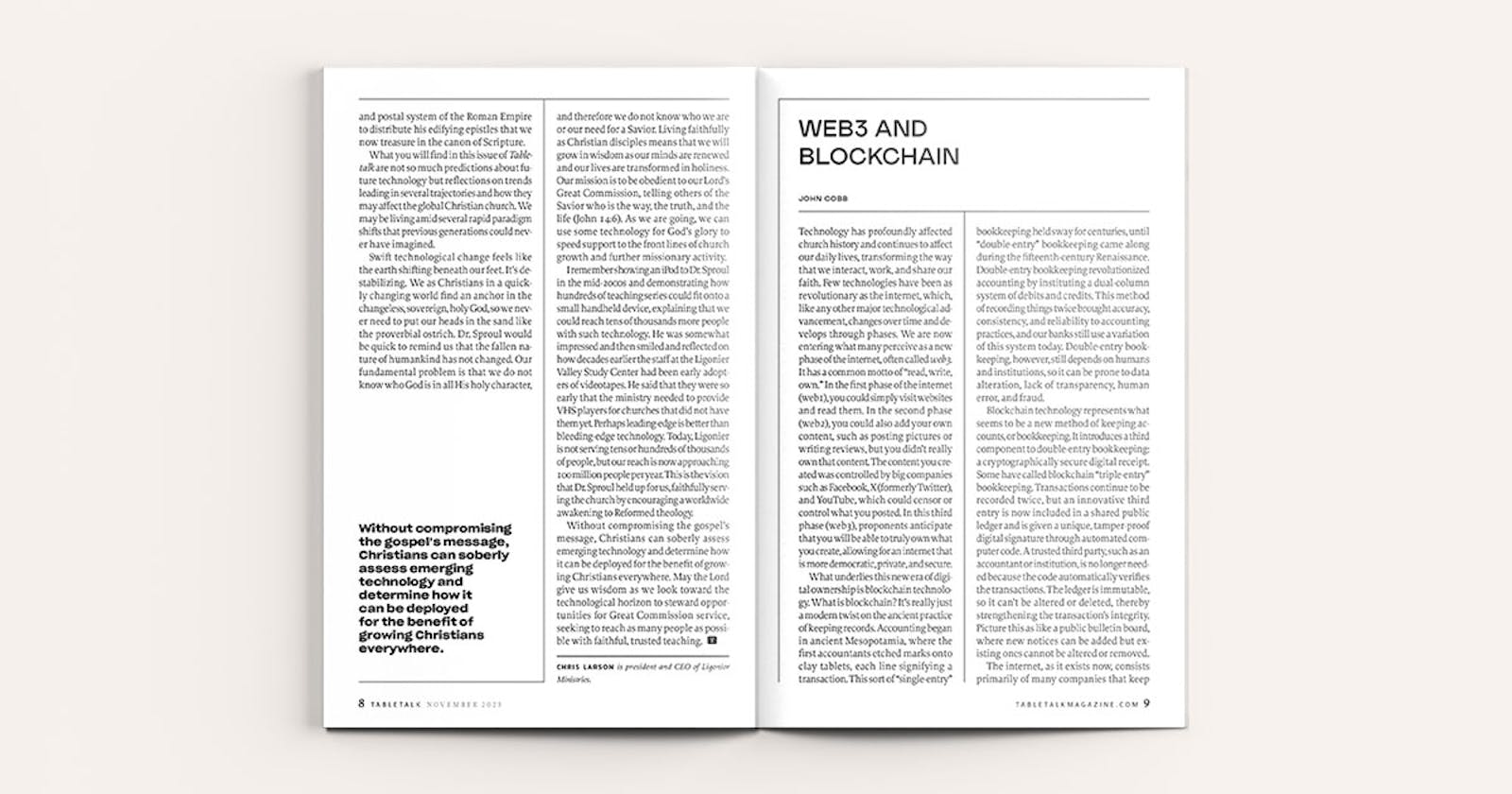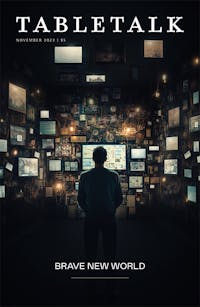
Request your free, three-month trial to Tabletalk magazine. You’ll receive the print issue monthly and gain immediate digital access to decades of archives. This trial is risk-free. No credit card required.
Try Tabletalk NowAlready receive Tabletalk magazine every month?
Verify your email address to gain unlimited access.
Technology has profoundly affected church history and continues to affect our daily lives, transforming the way that we interact, work, and share our faith. Few technologies have been as revolutionary as the internet, which, like any other major technological advancement, changes over time and develops through phases. We are now entering what many perceive as a new phase of the internet, often called web3. It has a common motto of “read, write, own.” In the first phase of the internet (web1), you could simply visit websites and read them. In the second phase (web2), you could also add your own content, such as posting pictures or writing reviews, but you didn’t really own that content. The content you created was controlled by big companies such as Facebook, X (formerly Twitter), and YouTube, which could censor or control what you posted. In this third phase (web3), proponents anticipate that you will be able to truly own what you create, allowing for an internet that is more democratic, private, and secure.
What underlies this new era of digital ownership is blockchain technology. What is blockchain? It’s really just a modern twist on the ancient practice of keeping records. Accounting began in ancient Mesopotamia, where the first accountants etched marks onto clay tablets, each line signifying a transaction. This sort of “single-entry” bookkeeping held sway for centuries, until “double-entry” bookkeeping came along during the fifteenth-century Renaissance. Double-entry bookkeeping revolutionized accounting by instituting a dual-column system of debits and credits. This method of recording things twice brought accuracy, consistency, and reliability to accounting practices, and our banks still use a variation of this system today. Double-entry bookkeeping, however, still depends on humans and institutions, so it can be prone to data alteration, lack of transparency, human error, and fraud.
Blockchain technology represents what seems to be a new method of keeping accounts, or bookkeeping. It introduces a third component to double-entry bookkeeping: a cryptographically secure digital receipt. Some have called blockchain “triple-entry” bookkeeping. Transactions continue to be recorded twice, but an innovative third entry is now included in a shared public ledger and is given a unique, tamper-proof digital signature through automated computer code. A trusted third party, such as an accountant or institution, is no longer needed because the code automatically verifies the transactions. The ledger is immutable, so it can’t be altered or deleted, thereby strengthening the transaction’s integrity. Picture this as like a public bulletin board, where new notices can be added but existing ones cannot be altered or removed.
The internet, as it exists now, consists primarily of many companies that keep accounts, or ledgers, of what we’ve posted, what emails we’ve sent or received, or what money we have in our bank accounts. These companies are often large corporations, such as Google, Facebook, X, Amazon, Apple, and Chase. We depend on these organizations’ goodwill for access to our digital property. With blockchain technology, it’s possible that in the future, internet users won’t depend on any individual organization for access to and management of their property. Rather, what one owns on the internet will be immutably recorded on the blockchain, so no large corporation—or anyone, for that matter—will be able to take your digital property away from you. Many refer to this idea as decentralization, because blockchain decentralizes bookkeeping authority. This technology, therefore, has the potential to be truly revolutionary, overturning business models, changing corporations, and enabling new means of engagement on the internet that aren’t so controlled by third parties.
Given this potential for change, how can Christians anticipate the future? What benefits and dangers might Christians need to consider in thinking about the future of the internet? Here are a few:
Free Speech. The right to free speech is often regarded as the right upon which all other rights are built. It encompasses our ability to share the faith openly without fear of persecution or censorship. Web3 consists of decentralized applications that run on the blockchain. The use of these independent protocols could represent both a danger and an opportunity for free speech, since we will perhaps no longer be at the mercy of tech or media companies that determine what’s appropriate to say. While it’s possible that with no filter whatsoever, free speech will descend into a chaos of noise, at the same time, undiluted gospel proclamation could benefit.
Constraint. The adoption of blockchain has the potential for harmful constraint, most notably the prospect of heightened regulation. For instance, nations can develop Central Bank Digital Currencies (CBDCs) to assert tighter control over their currencies. China’s release of the digital yuan, which allows it to control, track, manipulate, and potentially block all transactions within its borders, is a case in point. Blockchain’s versatility, however, also enables the removal of constraints on fund transfers and international communication, since digital currencies aren’t inherently subject to central government control, with Bitcoin being one example. While this can inadvertently facilitate illegal activities, it also signifies that Christians’ finances perhaps wouldn’t be easily subjected to the whims of corporations with sinful agendas or oppressive political regimes. It could also make it easier to support missionaries and ministries in countries that are hostile to Christianity. Thus, blockchain could potentially offer Christians greater freedom, support, and encouragement, particularly in nations where gospel proclamation is suppressed.
Trust. The recent boom in AI technologies poses a risk for truth and trust in many ways because they can often convincingly imitate people and institutions. To combat this, blockchain could serve as the standard of origin for original content. For example, bad actors might maliciously create or distort a piece of content, such as an article or a video, but content posted on a blockchain is unalterable and can prove where a work came from, almost like a watermark. Blockchain could provide a “proof of truth” or “proof of originality” through a ledger of public, immutable, and permanent content ownership and authenticity.
Privacy. Unlike the current internet, where YouTube, Facebook, PayPal, and other organizations often require you to share personal details before using their services, decentralized apps don’t necessarily require users to provide personal data to access services and content or to make transactions. This enables anonymous usage. While anonymity can provide a cover for unhealthy and sinful engagement on the internet, Christians living under authoritarian regimes could leverage this anonymity to freely access gospel resources and donate to ministries without facing political persecution. By removing the need for identity verification, believers in oppressive contexts could engage in and contribute to global ministry efforts with minimized risk.

Distribution. What if we could distribute Christian content around the world instantly, without political repercussions, and practically for free? One of the most attractive features for Christian missions and education is the capability within these technologies for seamless mass distribution of content around the world. Through decentralized networks, content creators could perhaps directly reach global audiences, bypassing geographical and political limitations.
Connection. Paul’s exhortation to the Thessalonians to “encourage one another and build one another up” (1 Thess. 5:11) is an ever-standing call to strengthen our Christian communities. Web3 could help the church in its effort to gather and grow together. While God’s people are called to gather physically in local churches primarily, there is also an opportunity to use technology to further the spread of the gospel and discipleship resources to Christians and churches worldwide. Christians, ministries, and churches do not currently own the platforms where Christian communities gather digitally, such as Facebook, X, Instagram, and YouTube. Because we don’t own these platforms, our communities can be censored at any moment or taken away without notice. Through web3 ownership, communities could perhaps be freer and more autonomous.
For all its perceived complexity and novelty, the decentralized web offers the global church benefits worth considering, although dangers certainly lurk in the background. To consider web3 and its potential does not represent an endorsement of blindly adopting all its aspects; rather, it’s a call to equip ourselves with knowledge of our times and of what the future could possibly hold, to apply our faith in discerning what aligns with our values, and to engage wisely with the world. As Christians, we draw comfort from knowing that God is ultimately in control, and we can find solace in the truth that Jesus is the supreme authority over all powers (Col. 2:9–10).
what now?
We find ourselves on the cusp of a new digital age, one in which we are being presented with a remarkable opportunity to thoughtfully engage with these emerging developments—much as our forefathers did in their times. Approaching this journey with proper wisdom and discernment, we should strive to carry the gospel to people where they are (1 Cor. 9:19–23), remembering how church history stands as a faithful proof that the people of God effectively harnessed technology for the furtherance of the good news of Christ and the strengthening of the global church.
At the outset of such a daunting task, let us not lose heart as we navigate the challenges. Dr. Sinclair Ferguson was recently reflecting on Isaiah’s prophecy in 49:6: “I will make you as a light for the nations, that my salvation may reach to the end of the earth.” He said: “We’re living in days when this prophecy is being fulfilled [and] that’s true despite all the doom and gloom we hear. . . . It’s true we haven’t yet fully fulfilled the Great Commission, and the church often fails, but God’s promise to His Son that He will give Him the nations for His inheritance has not failed, and it will not fail.” As we engage with this new digital landscape, let us do so with discernment, seeking to use technology for the glory of our Lord Jesus Christ and the expansion of His kingdom.
